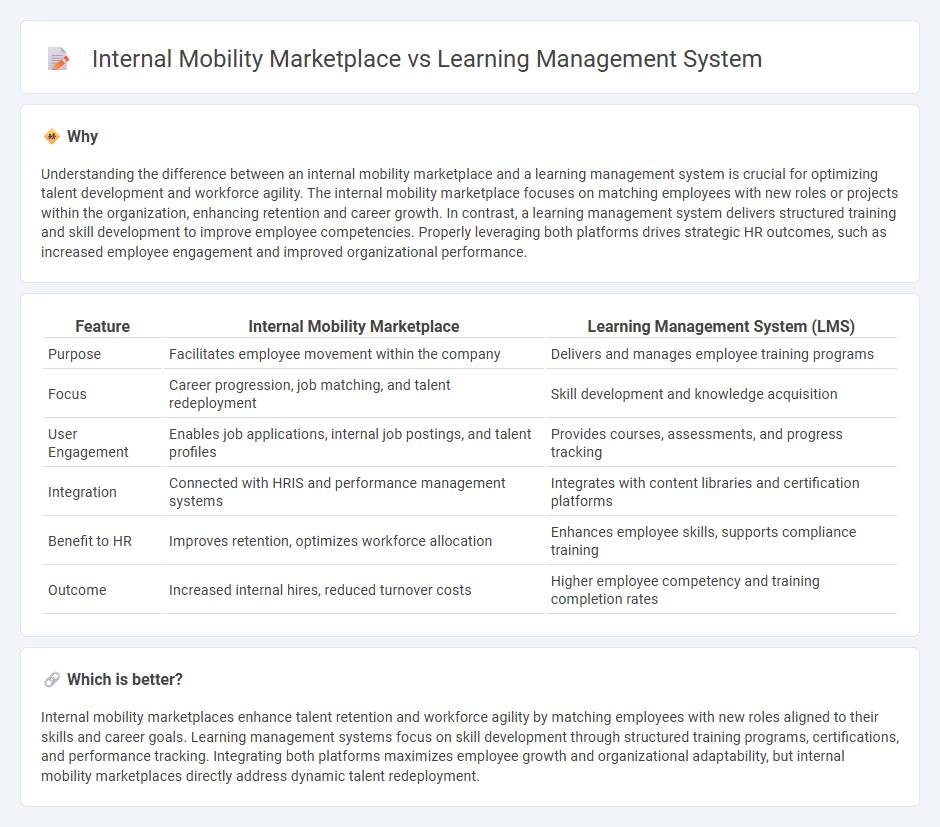
Internal mobility marketplaces streamline talent redeployment by matching employee skills with open roles, enhancing workforce agility and retention. Learning management systems focus on employee development through structured training programs, certifications, and skill-building content. Explore how integrating both solutions can maximize organizational potential and career growth.
Why it is important
Understanding the difference between an internal mobility marketplace and a learning management system is crucial for optimizing talent development and workforce agility. The internal mobility marketplace focuses on matching employees with new roles or projects within the organization, enhancing retention and career growth. In contrast, a learning management system delivers structured training and skill development to improve employee competencies. Properly leveraging both platforms drives strategic HR outcomes, such as increased employee engagement and improved organizational performance.
Comparison Table
| Feature | Internal Mobility Marketplace | Learning Management System (LMS) |
|---|---|---|
| Purpose | Facilitates employee movement within the company | Delivers and manages employee training programs |
| Focus | Career progression, job matching, and talent redeployment | Skill development and knowledge acquisition |
| User Engagement | Enables job applications, internal job postings, and talent profiles | Provides courses, assessments, and progress tracking |
| Integration | Connected with HRIS and performance management systems | Integrates with content libraries and certification platforms |
| Benefit to HR | Improves retention, optimizes workforce allocation | Enhances employee skills, supports compliance training |
| Outcome | Increased internal hires, reduced turnover costs | Higher employee competency and training completion rates |
Which is better?
Internal mobility marketplaces enhance talent retention and workforce agility by matching employees with new roles aligned to their skills and career goals. Learning management systems focus on skill development through structured training programs, certifications, and performance tracking. Integrating both platforms maximizes employee growth and organizational adaptability, but internal mobility marketplaces directly address dynamic talent redeployment.
Connection
Internal mobility marketplaces enhance talent redeployment by integrating with learning management systems (LMS) that provide personalized skill development and training paths. This connection enables employees to identify skill gaps for targeted learning, aligning career progression opportunities with organizational needs. Leveraging real-time LMS data within the internal mobility platform optimizes workforce agility and retention by matching internal candidates to roles based on verified competencies.
Key Terms
**Learning Management System:**
A Learning Management System (LMS) is a software platform designed to deliver, track, and manage employee training and development programs efficiently. It centralizes educational content, facilitates certification processes, and provides analytics on learner progress, enhancing workplace skill-building and compliance. Discover how integrating an LMS can transform your organizational learning strategy.
e-Learning
A learning management system (LMS) provides a centralized platform for delivering, tracking, and managing e-learning content and employee training programs, enhancing skill development across organizations. In contrast, an internal mobility marketplace focuses on matching employee skills and career aspirations with internal job opportunities, fostering career growth and workforce agility. Explore how integrating LMS with internal mobility solutions can maximize employee engagement and organizational performance.
Course Administration
Course administration in a learning management system (LMS) streamlines content delivery, enrollment, and progress tracking for educational programs. In contrast, internal mobility marketplaces emphasize role-based training and skill development aligned with career advancement opportunities within the company. Explore the distinct benefits and functionalities of each platform to optimize your organizational learning strategy.
Source and External Links
What is a Learning Management System (LMS)? - TechTarget - An LMS is software or web-based technology that plans, implements, and assesses learning processes, allowing instructors to create content, monitor participation, and assess performance across businesses and educational institutions.
Learning management system - Wikipedia - An LMS administers, tracks, reports, automates, and delivers educational and training courses, supporting both synchronous and asynchronous online learning and widely adopted especially since the COVID-19 pandemic.
What Are Learning Management Systems, and How do you Choose ... - LMSs help companies manage the full lifecycle of employee learning, including course creation, distribution, progress tracking, analytics, and program adjustments, making them vital for effective online training.
 dowidth.com
dowidth.com